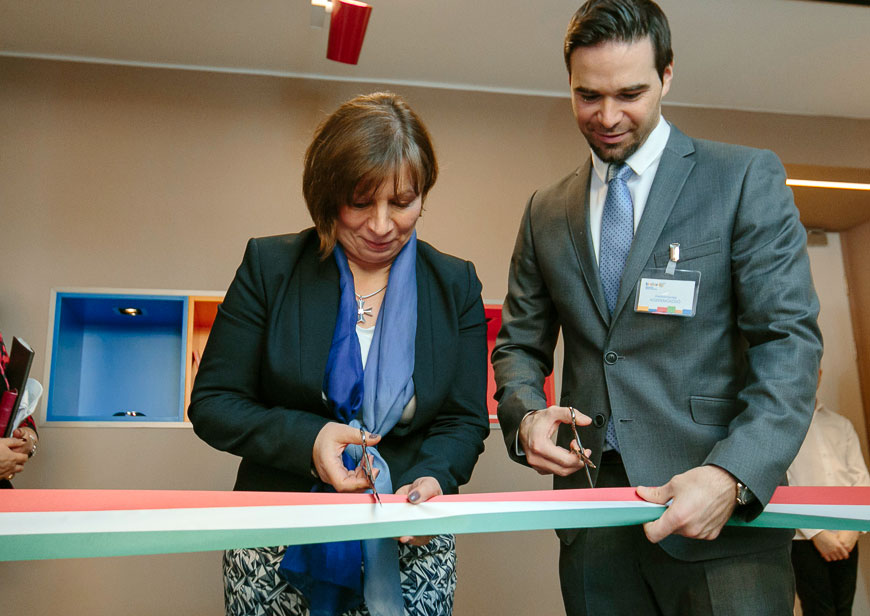Hungary’s second Magic Valley Media Literacy and Education Centre opened in Debrecen
nullAt the grand opening ceremony held on 8th February, president of the National Media and Infocommunications Authority (NMHH) Monika Karas opened the Magic Valley of Debrecen, Hungary’s second media literacy and education centre, which is the first one outside Budapest.

NMHH opened the first training centre designed to enforce media literacy and awareness in Hűvösvölgyi út, Budapest, in May 2014, and it has been operating ever since with great success. More than 17 thousand students from over 200 settlements, approximately one-third of them multiply disadvantaged children or from underprivileged settlements, have visited the institute since its opening and attended sessions led by trained media literacy instructors. Based on the popularity and the workload of the Budapest centre, it is safe to assume that the Debrecen facility will have a similarly busy schedule ahead.
At the Debrecen opening ceremony Monika Karas emphasized that the second Magic Valley centre provides students with practical experience and skill development options to help them find their ways around the digital space.
“We at NMHH believe that if we can get children to use their smart devices with critical interest and prudence, and with time media awareness becomes a self-evident competency to them, they will become more balanced, self-confident and responsible adults. I trust that the Debrecen Magic Valley will enrich them with experience they will never forget and will become an integral part of their lives they can take home away from here,” President Karas said.
“Debrecen will also be a good place for Magic Valley,” commented Deputy Mayor Dr. Lajos Barcsa. “We really needed a high quality media literacy training centre. Investment in education always produces returns. We thank the NMHH management for selecting Debrecen as the venue of the Eastern Hungarian centre. I am sure that hundreds of children will use this institution with delight and a thirst for knowledge,” he added.
By implementing a Magic Valley network, NMHH strives to create centres with cutting-edge technology and qualified media literacy trainers to teach students in a fun and creative way in the presence of their teachers about what influence the media has on them. Instructors and educators have an immense responsibility in helping students understand today’s digital-based society and economy, and we need to support them in this endeavour with as much help as we can. Teachers can provide key guidance to students and children familiarizing themselves with the various elements of the media. Educators registered on the website of the Magic Valley can access the multimedia creations of their student groups after the visit, so they can easily integrate the lessons of the sessions into their own classroom work on media.
Learning by studio situation exercises and from own experience
Students between 9 and 16 years of age can learn new skills that will help them interpret and use the various types of media content available. In the Magic Valley, the issues on media operation find their way to generation Z to help these children understand both the positive and the negative influence of the media. The centres were created in response to the media authority taking responsibility for guiding today’s youth in their understanding of the globalised virtual space. The sessions encourage students to use modern devices in a responsible manner and call their attention to the perfect opportunities these devices offer to obtain knowledge as well as to the unknown sources of threat.
One of the responsibilities of the Magic Valley is to equip children with self-confidence, healthy scepticism and critical approach. The experience-centred sessions help students acquire the basics of media awareness by producing media content themselves. NMHH has organized sessions in the modern studios around eight topics ranging from front page editing to advertisements and Internet communication. Debrecen will introduce a new session focusing on Internet risks and also will establish a fun framework for discovering the opportunities offered by the Internet. The news studio allows students to create impartial, pluralist news content from prepared materials and their own videos recorded on the spot.
Applicants expected from five counties
The program is aligned to the efforts outlined in the National Core Curriculum (NCC). Since, according to the NCC, currently media education is closely related to a number of other content areas and is not defined as an individual subject, basically, it is often not media teachers, but rather teachers with other majors (e.g. Hungarian language and literature, drawing, etc.) who take on the task of media education. To deal with the complexity of the topic, preparatory materials have been compiled. Students can work on these materials with help from their teachers prior to their visit to Magic Valley. The materials are arranged by the NMHH staff into different versions based on the depth of students’ prior media knowledge.
The Debrecen media awareness training centre of NMHH will accept students from Hajdú-Bihar, Szabolcs-Szatmár-Bereg, Borsod-Abaúj-Zemplén, Jász-Nagykun-Szolnok and Békés counties. Educators interested in this opportunity can learn more at http://buvosvolgy.hu/ . Visit to the Magic Valley is free in Debrecen as well, and the authority even provides free accommodation to participating student groups.
The news of the NMHH Magic Valley Network is worth following on Facebook with active information about the specialties of media operations: https://www.facebook.com/buvosvolgy/.
There is even an introductory video about the Debrecen centre to view in the video archive (‘Videotár’) menu of the NMHH website:
http://nmhh.hu/video/4890/A_debreceni_Buvosvolgy_Mediaertesoktato_Kozpont_Hivatalos_bemutatkozo_film